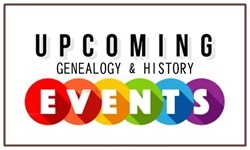Use Social Media to your (Genealogy) Advantage
Are you using social media to your (genealogy) advantage? A few of you might be, but I reckon the majority of you aren’t, and I’m here to tell you just how you can be using Facebook for far more than keeping up with what your family and friends are doing.
These days there are literally hundreds of social media sites around, if you don’t believe me check out Wikipedia.
To get just a little what I want to cover are the big ones that fall under the title of ‘Social Media Networking’ – you know, Facebook, Twitter, Google+ and I’ll throw in YouTube as well, because it is useful.
—————————————————————————————-
![]() FACEBOOK – https://www.facebook.com/
FACEBOOK – https://www.facebook.com/
Facebook tends to be a love it or hate it type site, with a large portion of those who hate it being because privacy concerns. Trust me all of that is customisable, so you can control who sees what, but that’s not what this post is about. Here, I am going to be talking about Facebook pages and Facebook groups.
There are literally thousands of organisations, meaning museums, societies, genie group, town history pages, one name groups, family group of ..[so and so]…, genealogy help groups for a country, for a state, user groups for genealogy software out there. There are even pages for military history battalions, and pages/groups for cemeteries as well … the list simply goes on.
Now to cater for those who may not be a user of Facebook (or not a regular one) once you have created an account, to keep up with the news that each of these pages sends out on their Facebook page, you simply need to click on the “LIKE” button on their page. This will allow their news to show in your ‘newsfeed’. If you have found a Facebook ‘Group’, they are just a little different, as they have an “Ask to Join” button, which the admin person needs to approve before you will allowed to join. Once a member of the group, then you can see their news.
Now you may be wondering how do you even find these pages/groups in the first place? Well, the big long white box at the top of the page (next to the Facebook ‘f’ logo) that says “search for people, places, things” … simply type in there.
If you type in the word “genealogy” or “history” it’s really interesting to see what you come up with. Here’s a list that I compiled back in November last year on 100 Facebook Links for Australian Genealogy. Now I know for a fact that there a far more groups that have joined up since then, so don’t be afraid to search.
And if you don’t believe me that Facebook groups/pages are a good thing, then have a read of KK Genealogy’s ‘Out of the Blue’ post, but be sure to have some tissues on hand.
![]() TWITTER – https://twitter.com/
TWITTER – https://twitter.com/
Now let’s move on to Twitter. ‘Genealogy in 14o characters is less’ is becoming a bit of a catch-phrase, meaning that people want to, and can research online using Twitter. You may wonder how on earth that can be, but stay with me for a bit, and I shall tell you.
I will say that Twitter does take a little getting used to, at least in comparison to Facebook. You do only have about two lines (140 characters) that you can type into one entry, but you get used to that pretty quick. First things first, once you create a Twitter account to be useful you need to follow people.
There’s two ways you can do this. First up you can search for people, companies, organisations, etc that might interest you simply by typing in a keyword in the searchbox up the top. For instance type in “genealogy” and it somes up with hundreds of entries, each with a ‘Follow” button alongside. Once you hit that button, anything that person “tweets” will then show in your feed (like your wall on Facebook). Some may tweet lots, others rarely, but it’s purely up to you who you follow. And if you find someone isn’t interesting after all, you can simply click on the “Unfollow” button.
Another way to search for people that are likely to have the same interests as you, is to search by hashtag. Now think of a hashtag (#) as a keyword. You might like to search for the hashtag #genealogy, or #familyhistory or a locality like #London or #Melbourne, or keywords like #historicalfacts. Yes, you do have to make it all one word with no spaces). If someone tweets using a hashtag you are following, you may wish to follow them, as they could be interesting.
Once again, you will find not only regular genealogy obsessed people who love sharing their finds (and woes) with the rest of the genealogy community online, but you can also find genealogy societies, state archives, libraries, museums, one name groups, commercial organisations there too. It truly is the place to “keep up with the instantly latest” news.
Now I said that Twitter is an awesome tool for genealogy research. It can be by keeping you up-to-date and informed on the latest genie news from around the world. You can also use it to ask questions like, can anyone recommend a good researcher for Yorkshire, England? or whatever. So no, you don’t find RECORDS online on Twitter, but you gain INFORMATION from it, and that I find is invaluable.
If Twitter seems like a foreign language to you, but you’d like to know more, check out this great Twitter Cheat Sheet which you’ll find useful.
![]() GOOGLE+ – https://plus.google.com/
GOOGLE+ – https://plus.google.com/
Now moving on to Google+. This is the the newest of the big name social media networking sites, but it is growing at an alarming rate.
It has also seen a number of people leave Facebook and/or Twitter and head on over – they find it that good. Personally I use it in conjuction with the other two, mainly because it largely has a different audience.
You’ll find Google Plus (G+ as it’s often known as), far more like Facebook. You can write as much as you want in your status update. You can circles that you can group people in, which are like the groups you can use on Facebook – each of them allows you to choose who sees what you post.
Hashtags are also used on Google+, so you can search for hashtags, and “circle” (which means follow) people that was if you like. Or you can find someone or an organisation, and check out who they are following. Doing it that way is often a whole lot quicker than simply searching. You won’t find everyone (genie group, organisation etc) that is on Facebook, also on G+. As I said it is the newer one, and not every place wants the responsibility of having to maintain multiple social media accounts, but you’ll find many there.
![]() YOUTUBE – https://www.youtube.com/
YOUTUBE – https://www.youtube.com/
Now I don’t want to say a whole lot about YouTube, but trust me there are far more than kids doing stupid stunts and cat movies on YouTube. Try searching for the town your reli’s came from – you might be surprised at what old movies are now online. Want to know the best way to organise your genealogy? Look on YouTube there’s a whole bunch of videos showing different methods there. Do you use genealogy software? Need a little help? There’s quite likely some tutorial videos you can watch to help you out. Didn’t make it to that big genie conference that you’d hoped to? Well, check out YouTube, as quite likely there will some videos of some of the key talks.
Museums, State Libraries, big companies like Ancestry, Findmypast and FamilySearch as well as genealogy software publishers all regularly upload new YouTube videos. If you find you like a number of videos from a particular person/company, you can ‘subscribe to their channel’. That simply means that you will then be notified (emailed) when they upload new videos. So like I said at the beginning it is far more than just cat movies!
—————————————————————————————-
So there you go. If I have even mildly made you think about maybe using your social media in a new way, then this post was worth it. Social media is a product of modern society, and I would say it’s here to stay, so why not use it to your advantage. Trust me you can have some BIG, BIG breakthroughs with your research by utilising it.





I have dipped my toe into various social media, and know I could get more out of them than I currently do. Thanks for these hints and links.
Anne, go and have fun. There’s a lot of genealogy that can be learnt through social media.
Show how rubbish my geography is. When I first read your comment I thought Copenhagen was in Germany. I thought why don’t you just come to Munich, Luckily I looked it up and found out you would have to further than I would. To make a course viable I need six people to come, do you think any of you friends would be interested? Are they any local groups that might help to promote it?
We watched the movie Food, Inc. a couple weeks ago. At the end of the movie they highlighted several people involved in the FDA and other controlling positions in the government who were high ranking officials at companies like Monsanto, ConAgra, and others. That's the reason why I don't think that the FDA is the right group to be determining if something is safe or not. It's a political organization. I think that any kind of regulation, no matter what it is that is being regulated, needs to be by private non-profit groups that provide some way of monitoring non-partiality.